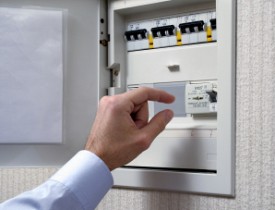How to Avoid Breaker Trips

It happens to everyone: tripped electrical breakers. If you have ever plugged in your hairdryer, toaster oven or space heater only to be engulfed in darkness, you know what it's like. Sometimes having a circuit breaker trip is a minor inconvenience, readily repaired with the flick of a switch. However, when your breaker keeps tripping, that’s a sign of a bigger issue. Learn what circuit breaker trips mean and how to troubleshoot them.
Why a Circuit Breaker Trips
Essentially, a circuit breaker will trip when the current exceeds the amps your system can handle, i.e. your electrical system is overloaded.
Circuit breakers come in different amp ratings, so some systems can handle more current than others. If you live in an older home or apartment with few outlets, your system may have a lower amp rating, which will make breakers trip more easily.
Most important, circuit breakers perform an important safety task. When a breaker trips, it is keeping your electrical system from a literal meltdown, which can cause a fire.
Tips to Avoid Breaker Trips
- Unplug electrical appliances that are not in use. Electrical current still runs to the appliance even if it is not turned on.
- Be especially aware of how many appliances you have plugged in during very hot or cold weather. Air conditioners and space heaters, for example, are energy suckers. In the winter, you will likely have more lamps burning.
- If you have few outlets, try to spread your biggest energy users around.
- Also, if you have few outlets, avoid using an extension plug or power strip, which will tax your system more.
- Make sure that none of your appliance cords is damaged, frayed, scorched, or melted.
Grounding Problems
Sometimes, especially in older homes, wiring can become loose or melt, or it may have been installed incorrectly in the first place. For example, you or a previous owner may have tried to repair your electrical wiring when it would have been preferable to have a professional do the job.
You have a grounding problem if you open the outlet panel and a black (hot) wire is touching a:
- white (neutral) wire
- bare copper wire
- different black wire
- outlet box
If you are inspecting your home's wiring, it's important to also check for any damaged or melted wires. Note whether you smell any burning odors in the area of the outlet box.
Short Circuits
Circuit breaker trips can arise when either your electrical system or one of the appliances you’re using has a short. It can be painstaking in some homes, but you can track down where the short is. Don't forget to keep a flashlight handy - especially if your electrical panel is in the basement.
Here’s how to find the source of a short circuit: Unplug and turn off every electrical light or appliance. Turn off the power at your service panel, reset all the switches, and then turn the power back on. If the circuit breaker trips immediately, the short is in your house wiring.
To figure out whether the short is in an appliance, use a process of elimination. Turn the power on and, one by one, plug each appliance in. See whether a particular appliance causes a breaker trip. Again, make sure your appliance cords are in good shape.
If you find yourself with a breaker that keeps tripping or other recurring electrical problems, consult a licensed electrician. You may need to have your electrical panel repaired and/or the house rewired.
Updated December 24, 2017.
Looking for a Pro? Call us (866) 441-6648

Electrical Average Costs
Electricians Experiences

Circuit Breaker Replacement For A K9 Facility

Whole House Fan Installation Saves Me Money On Electricity



